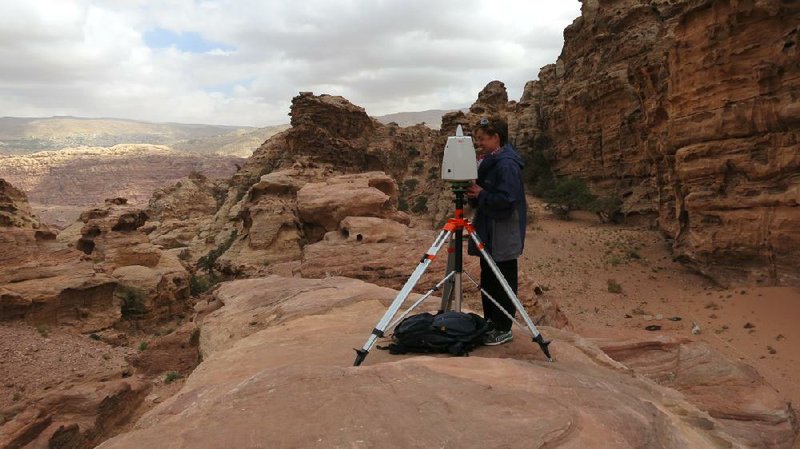The excitement surrounding the University of Arkansas Razorbacks' football team is already growing for the fall.
Realistically, the team is still rebuilding and will probably disappoint some fans. We're sort of used to it.
There is, however, a team up in Fayetteville that is at the top of its game and will be featured in a three-part PBS series that will make us all proud.
Let's hear it for the Fighting Razorbacks Researchers from the Center for Advanced Spatial Technologies at the University of Arkansas!
That's a mouthful, but "CAST" is one of the world's pre-eminent research centers in the field of geospatial analysis.
See the team in action when the first episode of Time Scanners airs on PBS today. AETN broadcasts the episode, "Egyptian Pyramids," at 7 p.m.
The remaining episodes, "St. Paul's Cathedral" and "Petra," follow at the same time on subsequent Tuesdays.
Yes, it's science. Yes, it's geeky. It's also fascinating and an insider's peek at these three iconic locations that we haven't seen before.
Time Scanners features world-renowned structural engineer Steve Burrows and the team of CAST laser-scanning experts using cutting-edge 3-D technology that can "read" buildings, ruins and landscapes from the ancient world.
Burrows notes, "The laser-scanning technology meant that we could analyze the ancient structures in a way that no one ever has before, and some of the things we found were incredible."
In tonight's episode, the team travels to Egypt to scan the pyramids "to find out how the necropolis evolved from simple mud-brick structures to the most impressive buildings in the ancient world."
On tap are Djoser's step pyramid at Saqqara, Meidum's collapsed pyramid, the mysterious Bent Pyramid at Dahshur and the famous Great Pyramid at Giza.
On July 8, the team heads to London to explore the ground-breaking three-part structure of the dome of St. Paul's Cathedral created by architect Sir Christopher Wren in the late 17th century. The dome even survived a direct hit by a German bomb during the London Blitz.
And on July 15, the ancient desert city of Petra in Jordan sheds new light on the architectural wonder that was carved out of solid rock more than 2,000 years ago. How did Nabatean stonemasons carve Petra's largest building -- the Monastery? And what lies hidden underneath the city? We'll find out.
What, exactly, is the Center for Advanced Spatial Technologies?
The center was established in the J. William Fulbright College of Arts and Sciences in 1991 and "is dedicated to research and applications in geospatial analysis and modeling, remote sensing and digital photogrammetry."
According to UA, "Remote sensing is the measurement or acquisition of information about an object without direct contact, such as by satellite imaging, radar or aerial photography. Photogrammetry is the science of recording, measuring and interpreting photographic images or other two-dimensional, remotely sensed data."
Billions of measurements allow the team to form what is known as a "point cloud," which provides a 3-D perspective.
"This was a once-in-a-lifetime experience for our researchers to create point clouds for some of the world's most famous feats of architecture and engineering," said Jackson Cothren, director of the center, in a UA news release. "We were recognized as one of the pre-eminent organizations that could do this. Being part of this series capped a decade-long growth period for CAST."
It sounds complicated, but it makes for a fascinating TV series on subjects most of us thought we knew all about.
• They'll be back. Fox has announced that current American Idol judges Jennifer Lopez, Keith Urban and Harry Connick Jr. will be returning for Season 14. The show's ratings may be on the wane, but this combo was the best panel yet.
The Season 12 panel, which included Mariah Carey and Nicki Minaj in a colossal waste of money, saw ratings plunge by a stunning 23 percent.
• Once (yawn) more. TV keeps trying to beat the dead music competition horse.
ABC tweaked the hackneyed formula with a live vote gimmick and rolled out Rising Star on June 21. A disappointing few -- 5.1 million -- watched the two-hour premiere.
Granted, it was the first show, but the three celebrity judges -- Ludacris, Kesha and Brad Paisley -- seemed as if they had only met five minutes beforehand. Host Josh Groban had the look of a deer in the headlights, and the talent was, well, unremarkable.
We've seen it all before.
• On the horizon. For 2015, TNT has ordered 10 episodes of the 1960s cop drama Public Morals. The series is from executive producers Steven Spielberg and Edward Burns (Saving Private Ryan, The Brothers McMullen, Mob City). Burns will also write and direct. Co-starring are Michael Rapaport (Justified, Prison Break) and Elizabeth Masucci (The Americans, Inside Amy Schumer).
The TV Column appears Sunday, Tuesday and Thursday. Email:
Style on 07/01/2014

